Report on Skills for Learning in Care: Importance and Practices
VerifiedAdded on 2020/07/22
|10
|2646
|123
Report
AI Summary
This report delves into the critical importance of skills for learning within health and social care settings, emphasizing the significance of reflective practices. It explores the role of reflection in enhancing patient care, fostering professional development, and establishing effective healthcare practices. The report analyzes various articles, books, and websites to illustrate the application of reflective practices, including the analysis of situations, emotional states, and critical reviews. It highlights the stages of reflection, such as analyzing situations, assessing emotional states, and changing practices for continuous improvement. Furthermore, the report examines the role of critical reflection in establishing and sharing good practices, using examples from the International Journal of Surgery Oncology and insights from social care professionals. The report also discusses tools like incidents, diaries, and supervision for engaging reflective practices, along with the importance of self-awareness and training in fostering a culture of reflection within healthcare organizations. Finally, it concludes by emphasizing the need for continuous improvement in healthcare settings and the role of self-awareness and reflection in professional development to enhance the quality of care provided to patients.
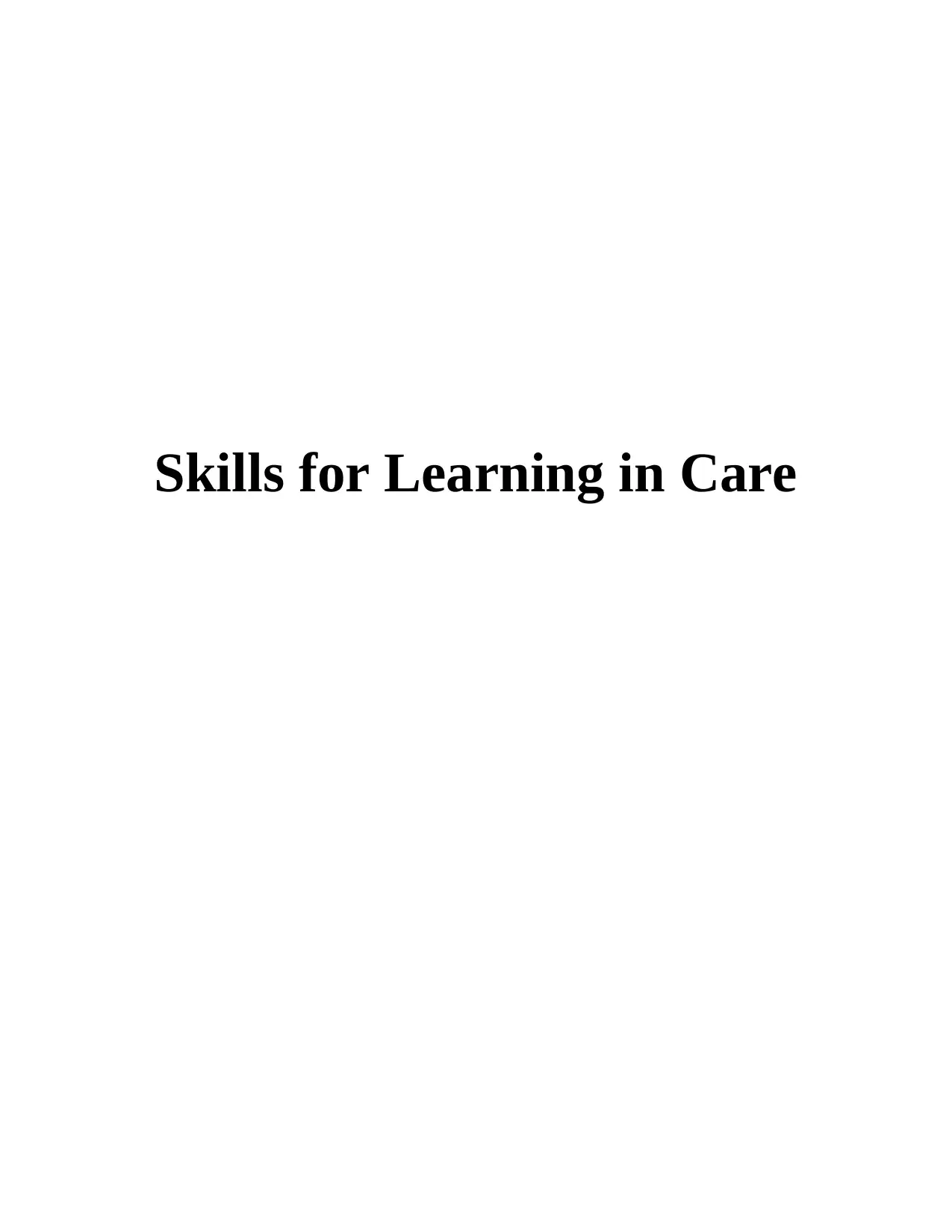
Skills for Learning in Care
Paraphrase This Document
Need a fresh take? Get an instant paraphrase of this document with our AI Paraphraser
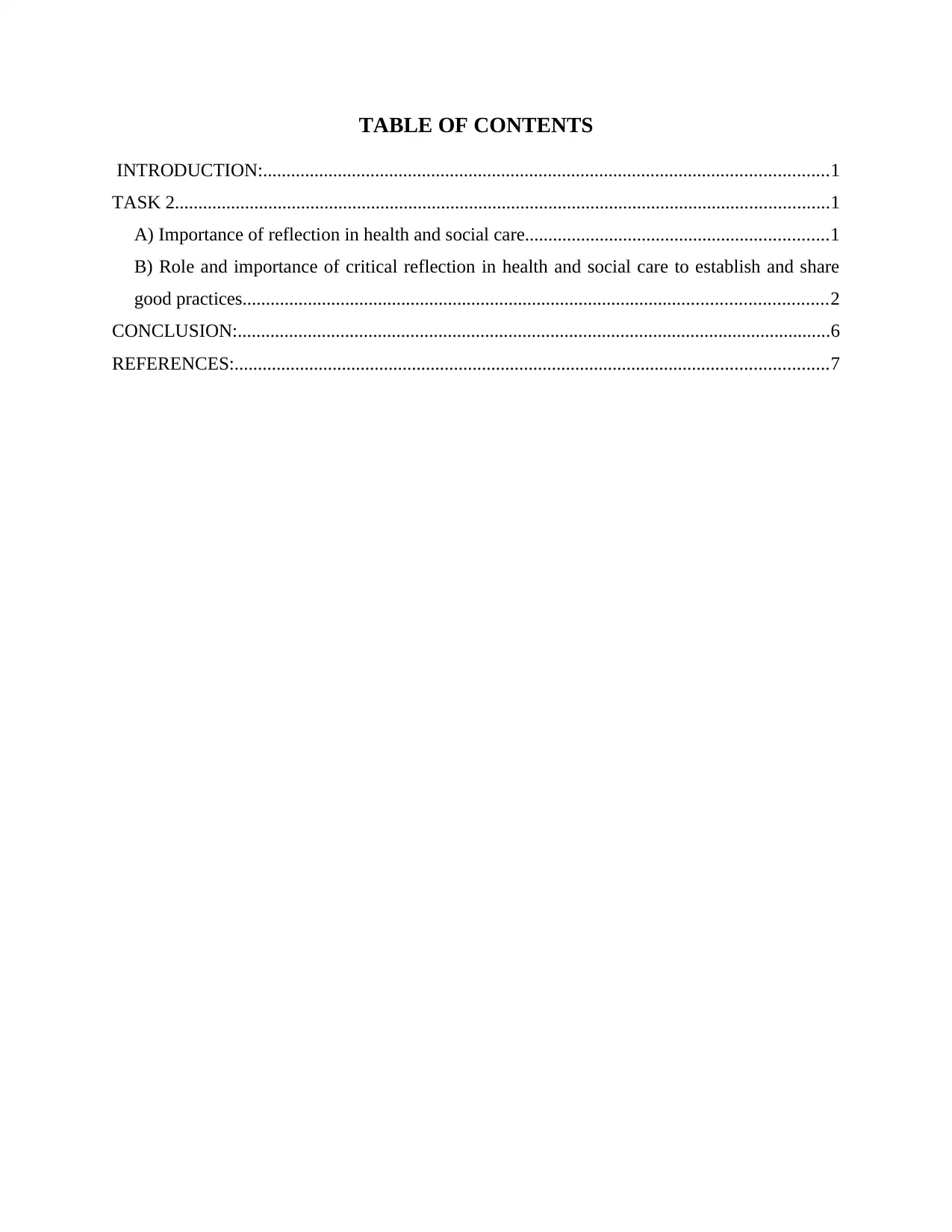
TABLE OF CONTENTS
INTRODUCTION:.........................................................................................................................1
TASK 2............................................................................................................................................1
A) Importance of reflection in health and social care.................................................................1
B) Role and importance of critical reflection in health and social care to establish and share
good practices.............................................................................................................................2
CONCLUSION:...............................................................................................................................6
REFERENCES:...............................................................................................................................7
INTRODUCTION:.........................................................................................................................1
TASK 2............................................................................................................................................1
A) Importance of reflection in health and social care.................................................................1
B) Role and importance of critical reflection in health and social care to establish and share
good practices.............................................................................................................................2
CONCLUSION:...............................................................................................................................6
REFERENCES:...............................................................................................................................7
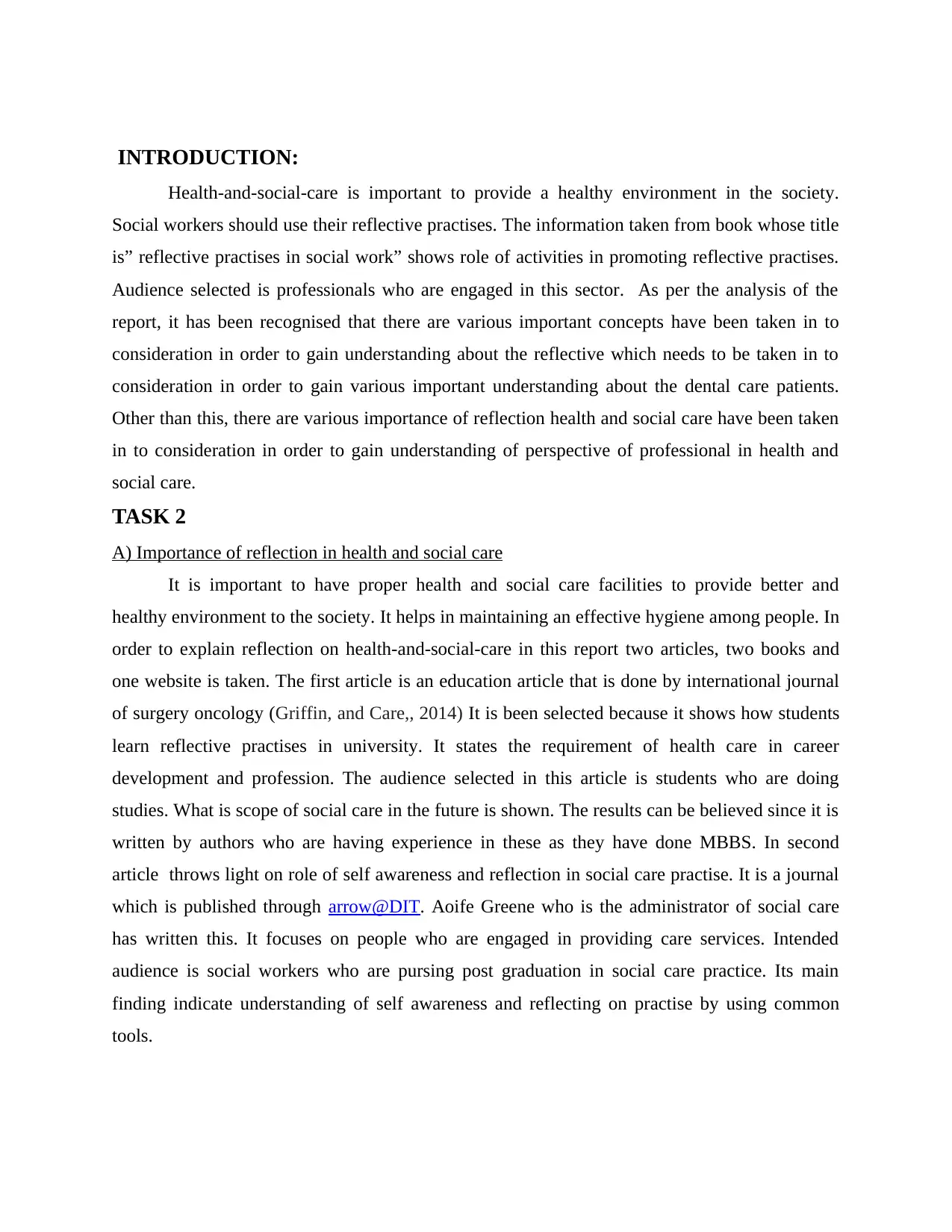
INTRODUCTION:
Health-and-social-care is important to provide a healthy environment in the society.
Social workers should use their reflective practises. The information taken from book whose title
is” reflective practises in social work” shows role of activities in promoting reflective practises.
Audience selected is professionals who are engaged in this sector. As per the analysis of the
report, it has been recognised that there are various important concepts have been taken in to
consideration in order to gain understanding about the reflective which needs to be taken in to
consideration in order to gain various important understanding about the dental care patients.
Other than this, there are various importance of reflection health and social care have been taken
in to consideration in order to gain understanding of perspective of professional in health and
social care.
TASK 2
A) Importance of reflection in health and social care
It is important to have proper health and social care facilities to provide better and
healthy environment to the society. It helps in maintaining an effective hygiene among people. In
order to explain reflection on health-and-social-care in this report two articles, two books and
one website is taken. The first article is an education article that is done by international journal
of surgery oncology (Griffin, and Care,, 2014) It is been selected because it shows how students
learn reflective practises in university. It states the requirement of health care in career
development and profession. The audience selected in this article is students who are doing
studies. What is scope of social care in the future is shown. The results can be believed since it is
written by authors who are having experience in these as they have done MBBS. In second
article throws light on role of self awareness and reflection in social care practise. It is a journal
which is published through arrow@DIT. Aoife Greene who is the administrator of social care
has written this. It focuses on people who are engaged in providing care services. Intended
audience is social workers who are pursing post graduation in social care practice. Its main
finding indicate understanding of self awareness and reflecting on practise by using common
tools.
Health-and-social-care is important to provide a healthy environment in the society.
Social workers should use their reflective practises. The information taken from book whose title
is” reflective practises in social work” shows role of activities in promoting reflective practises.
Audience selected is professionals who are engaged in this sector. As per the analysis of the
report, it has been recognised that there are various important concepts have been taken in to
consideration in order to gain understanding about the reflective which needs to be taken in to
consideration in order to gain various important understanding about the dental care patients.
Other than this, there are various importance of reflection health and social care have been taken
in to consideration in order to gain understanding of perspective of professional in health and
social care.
TASK 2
A) Importance of reflection in health and social care
It is important to have proper health and social care facilities to provide better and
healthy environment to the society. It helps in maintaining an effective hygiene among people. In
order to explain reflection on health-and-social-care in this report two articles, two books and
one website is taken. The first article is an education article that is done by international journal
of surgery oncology (Griffin, and Care,, 2014) It is been selected because it shows how students
learn reflective practises in university. It states the requirement of health care in career
development and profession. The audience selected in this article is students who are doing
studies. What is scope of social care in the future is shown. The results can be believed since it is
written by authors who are having experience in these as they have done MBBS. In second
article throws light on role of self awareness and reflection in social care practise. It is a journal
which is published through arrow@DIT. Aoife Greene who is the administrator of social care
has written this. It focuses on people who are engaged in providing care services. Intended
audience is social workers who are pursing post graduation in social care practice. Its main
finding indicate understanding of self awareness and reflecting on practise by using common
tools.
⊘ This is a preview!⊘
Do you want full access?
Subscribe today to unlock all pages.

Trusted by 1+ million students worldwide
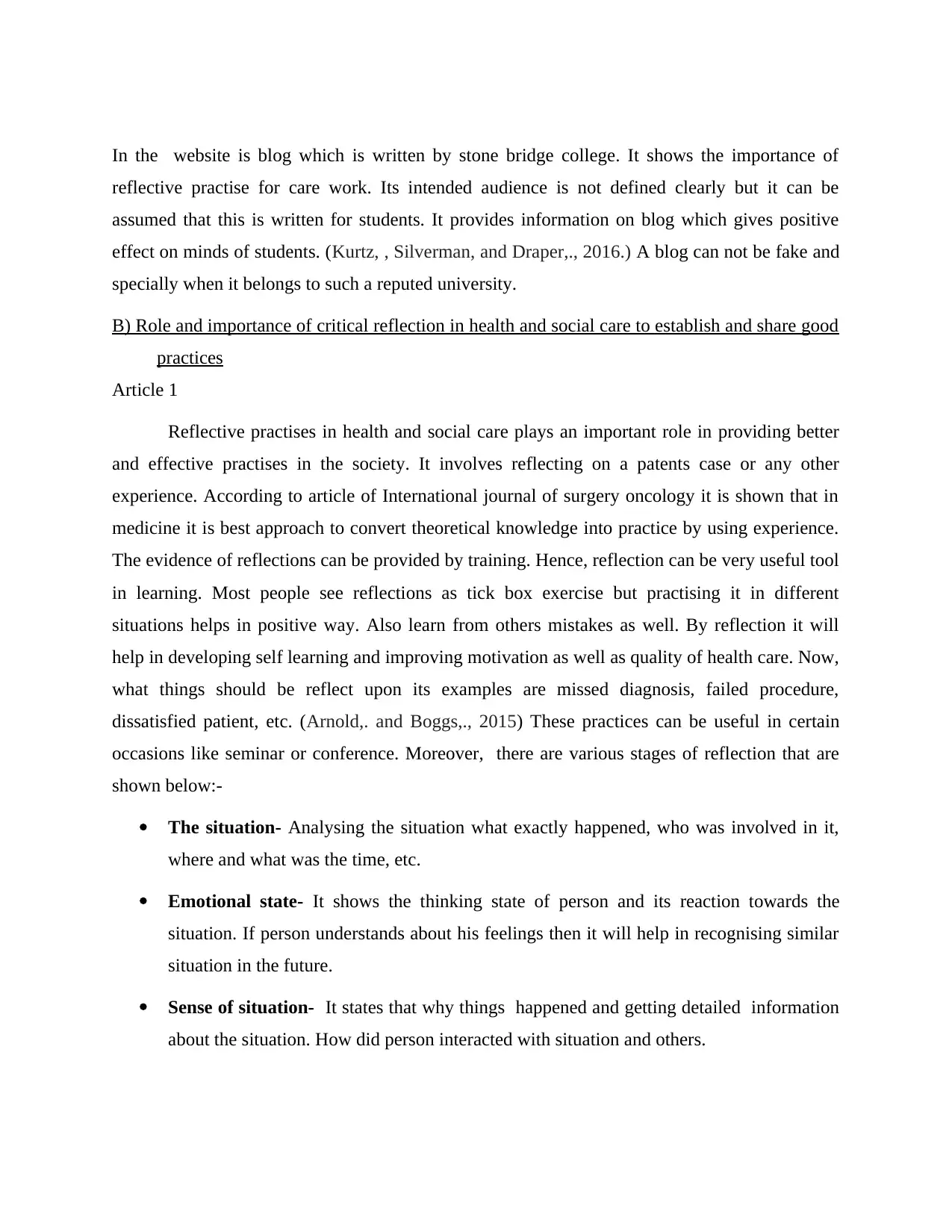
In the website is blog which is written by stone bridge college. It shows the importance of
reflective practise for care work. Its intended audience is not defined clearly but it can be
assumed that this is written for students. It provides information on blog which gives positive
effect on minds of students. (Kurtz, , Silverman, and Draper,., 2016.) A blog can not be fake and
specially when it belongs to such a reputed university.
B) Role and importance of critical reflection in health and social care to establish and share good
practices
Article 1
Reflective practises in health and social care plays an important role in providing better
and effective practises in the society. It involves reflecting on a patents case or any other
experience. According to article of International journal of surgery oncology it is shown that in
medicine it is best approach to convert theoretical knowledge into practice by using experience.
The evidence of reflections can be provided by training. Hence, reflection can be very useful tool
in learning. Most people see reflections as tick box exercise but practising it in different
situations helps in positive way. Also learn from others mistakes as well. By reflection it will
help in developing self learning and improving motivation as well as quality of health care. Now,
what things should be reflect upon its examples are missed diagnosis, failed procedure,
dissatisfied patient, etc. (Arnold,. and Boggs,., 2015) These practices can be useful in certain
occasions like seminar or conference. Moreover, there are various stages of reflection that are
shown below:-
The situation- Analysing the situation what exactly happened, who was involved in it,
where and what was the time, etc.
Emotional state- It shows the thinking state of person and its reaction towards the
situation. If person understands about his feelings then it will help in recognising similar
situation in the future.
Sense of situation- It states that why things happened and getting detailed information
about the situation. How did person interacted with situation and others.
reflective practise for care work. Its intended audience is not defined clearly but it can be
assumed that this is written for students. It provides information on blog which gives positive
effect on minds of students. (Kurtz, , Silverman, and Draper,., 2016.) A blog can not be fake and
specially when it belongs to such a reputed university.
B) Role and importance of critical reflection in health and social care to establish and share good
practices
Article 1
Reflective practises in health and social care plays an important role in providing better
and effective practises in the society. It involves reflecting on a patents case or any other
experience. According to article of International journal of surgery oncology it is shown that in
medicine it is best approach to convert theoretical knowledge into practice by using experience.
The evidence of reflections can be provided by training. Hence, reflection can be very useful tool
in learning. Most people see reflections as tick box exercise but practising it in different
situations helps in positive way. Also learn from others mistakes as well. By reflection it will
help in developing self learning and improving motivation as well as quality of health care. Now,
what things should be reflect upon its examples are missed diagnosis, failed procedure,
dissatisfied patient, etc. (Arnold,. and Boggs,., 2015) These practices can be useful in certain
occasions like seminar or conference. Moreover, there are various stages of reflection that are
shown below:-
The situation- Analysing the situation what exactly happened, who was involved in it,
where and what was the time, etc.
Emotional state- It shows the thinking state of person and its reaction towards the
situation. If person understands about his feelings then it will help in recognising similar
situation in the future.
Sense of situation- It states that why things happened and getting detailed information
about the situation. How did person interacted with situation and others.
Paraphrase This Document
Need a fresh take? Get an instant paraphrase of this document with our AI Paraphraser
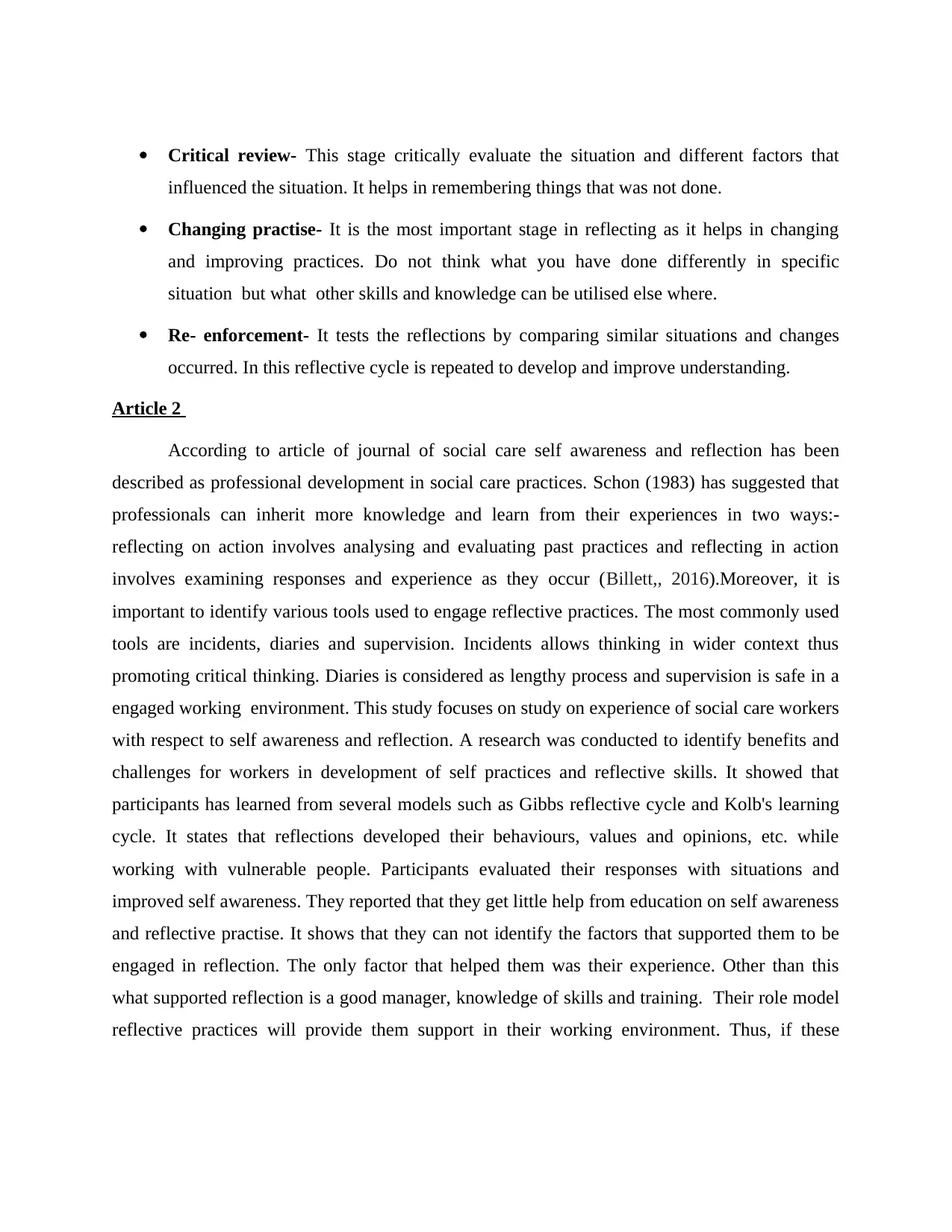
Critical review- This stage critically evaluate the situation and different factors that
influenced the situation. It helps in remembering things that was not done.
Changing practise- It is the most important stage in reflecting as it helps in changing
and improving practices. Do not think what you have done differently in specific
situation but what other skills and knowledge can be utilised else where.
Re- enforcement- It tests the reflections by comparing similar situations and changes
occurred. In this reflective cycle is repeated to develop and improve understanding.
Article 2
According to article of journal of social care self awareness and reflection has been
described as professional development in social care practices. Schon (1983) has suggested that
professionals can inherit more knowledge and learn from their experiences in two ways:-
reflecting on action involves analysing and evaluating past practices and reflecting in action
involves examining responses and experience as they occur (Billett,, 2016).Moreover, it is
important to identify various tools used to engage reflective practices. The most commonly used
tools are incidents, diaries and supervision. Incidents allows thinking in wider context thus
promoting critical thinking. Diaries is considered as lengthy process and supervision is safe in a
engaged working environment. This study focuses on study on experience of social care workers
with respect to self awareness and reflection. A research was conducted to identify benefits and
challenges for workers in development of self practices and reflective skills. It showed that
participants has learned from several models such as Gibbs reflective cycle and Kolb's learning
cycle. It states that reflections developed their behaviours, values and opinions, etc. while
working with vulnerable people. Participants evaluated their responses with situations and
improved self awareness. They reported that they get little help from education on self awareness
and reflective practise. It shows that they can not identify the factors that supported them to be
engaged in reflection. The only factor that helped them was their experience. Other than this
what supported reflection is a good manager, knowledge of skills and training. Their role model
reflective practices will provide them support in their working environment. Thus, if these
influenced the situation. It helps in remembering things that was not done.
Changing practise- It is the most important stage in reflecting as it helps in changing
and improving practices. Do not think what you have done differently in specific
situation but what other skills and knowledge can be utilised else where.
Re- enforcement- It tests the reflections by comparing similar situations and changes
occurred. In this reflective cycle is repeated to develop and improve understanding.
Article 2
According to article of journal of social care self awareness and reflection has been
described as professional development in social care practices. Schon (1983) has suggested that
professionals can inherit more knowledge and learn from their experiences in two ways:-
reflecting on action involves analysing and evaluating past practices and reflecting in action
involves examining responses and experience as they occur (Billett,, 2016).Moreover, it is
important to identify various tools used to engage reflective practices. The most commonly used
tools are incidents, diaries and supervision. Incidents allows thinking in wider context thus
promoting critical thinking. Diaries is considered as lengthy process and supervision is safe in a
engaged working environment. This study focuses on study on experience of social care workers
with respect to self awareness and reflection. A research was conducted to identify benefits and
challenges for workers in development of self practices and reflective skills. It showed that
participants has learned from several models such as Gibbs reflective cycle and Kolb's learning
cycle. It states that reflections developed their behaviours, values and opinions, etc. while
working with vulnerable people. Participants evaluated their responses with situations and
improved self awareness. They reported that they get little help from education on self awareness
and reflective practise. It shows that they can not identify the factors that supported them to be
engaged in reflection. The only factor that helped them was their experience. Other than this
what supported reflection is a good manager, knowledge of skills and training. Their role model
reflective practices will provide them support in their working environment. Thus, if these
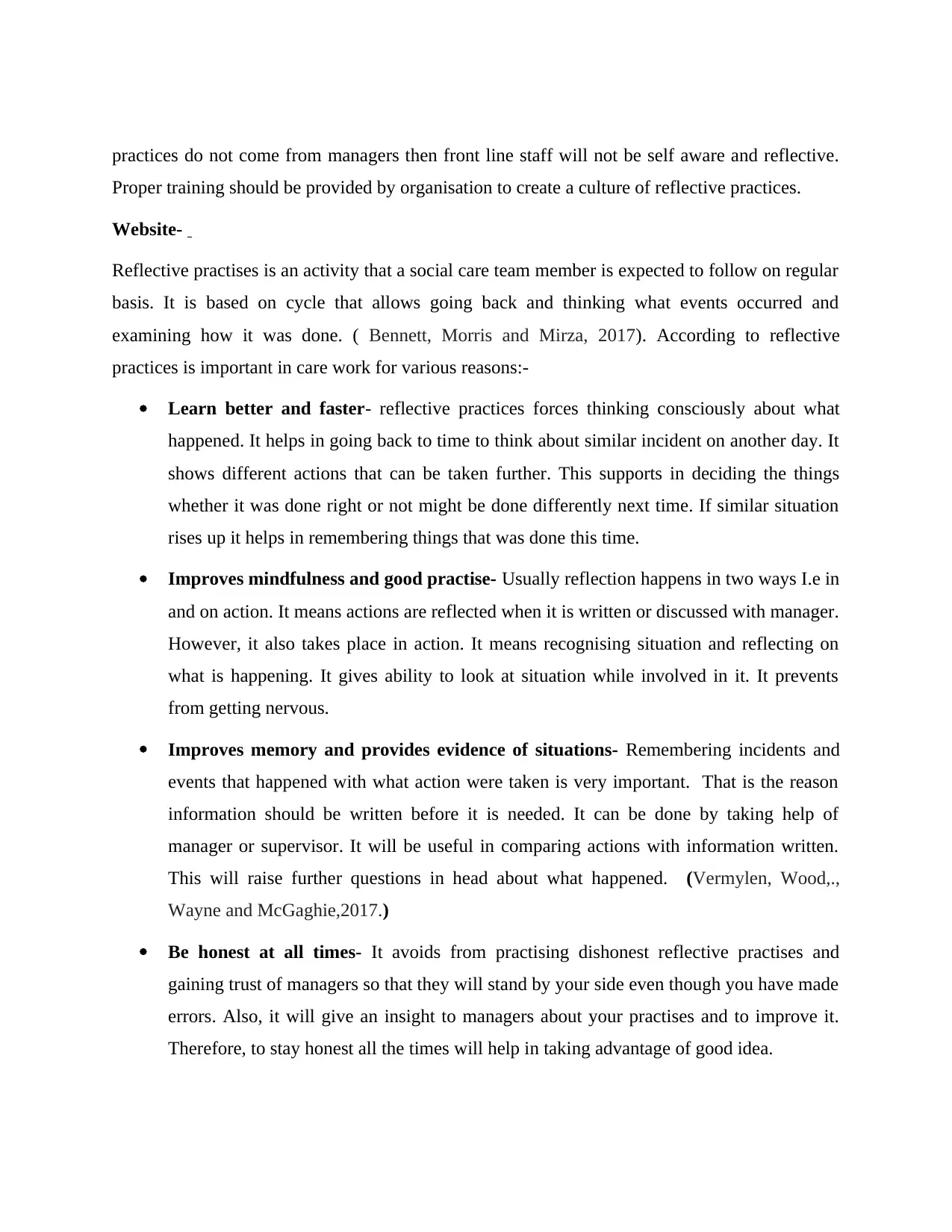
practices do not come from managers then front line staff will not be self aware and reflective.
Proper training should be provided by organisation to create a culture of reflective practices.
Website-
Reflective practises is an activity that a social care team member is expected to follow on regular
basis. It is based on cycle that allows going back and thinking what events occurred and
examining how it was done. ( Bennett, Morris and Mirza, 2017). According to reflective
practices is important in care work for various reasons:-
Learn better and faster- reflective practices forces thinking consciously about what
happened. It helps in going back to time to think about similar incident on another day. It
shows different actions that can be taken further. This supports in deciding the things
whether it was done right or not might be done differently next time. If similar situation
rises up it helps in remembering things that was done this time.
Improves mindfulness and good practise- Usually reflection happens in two ways I.e in
and on action. It means actions are reflected when it is written or discussed with manager.
However, it also takes place in action. It means recognising situation and reflecting on
what is happening. It gives ability to look at situation while involved in it. It prevents
from getting nervous.
Improves memory and provides evidence of situations- Remembering incidents and
events that happened with what action were taken is very important. That is the reason
information should be written before it is needed. It can be done by taking help of
manager or supervisor. It will be useful in comparing actions with information written.
This will raise further questions in head about what happened. (Vermylen, Wood,.,
Wayne and McGaghie,2017.)
Be honest at all times- It avoids from practising dishonest reflective practises and
gaining trust of managers so that they will stand by your side even though you have made
errors. Also, it will give an insight to managers about your practises and to improve it.
Therefore, to stay honest all the times will help in taking advantage of good idea.
Proper training should be provided by organisation to create a culture of reflective practices.
Website-
Reflective practises is an activity that a social care team member is expected to follow on regular
basis. It is based on cycle that allows going back and thinking what events occurred and
examining how it was done. ( Bennett, Morris and Mirza, 2017). According to reflective
practices is important in care work for various reasons:-
Learn better and faster- reflective practices forces thinking consciously about what
happened. It helps in going back to time to think about similar incident on another day. It
shows different actions that can be taken further. This supports in deciding the things
whether it was done right or not might be done differently next time. If similar situation
rises up it helps in remembering things that was done this time.
Improves mindfulness and good practise- Usually reflection happens in two ways I.e in
and on action. It means actions are reflected when it is written or discussed with manager.
However, it also takes place in action. It means recognising situation and reflecting on
what is happening. It gives ability to look at situation while involved in it. It prevents
from getting nervous.
Improves memory and provides evidence of situations- Remembering incidents and
events that happened with what action were taken is very important. That is the reason
information should be written before it is needed. It can be done by taking help of
manager or supervisor. It will be useful in comparing actions with information written.
This will raise further questions in head about what happened. (Vermylen, Wood,.,
Wayne and McGaghie,2017.)
Be honest at all times- It avoids from practising dishonest reflective practises and
gaining trust of managers so that they will stand by your side even though you have made
errors. Also, it will give an insight to managers about your practises and to improve it.
Therefore, to stay honest all the times will help in taking advantage of good idea.
⊘ This is a preview!⊘
Do you want full access?
Subscribe today to unlock all pages.

Trusted by 1+ million students worldwide
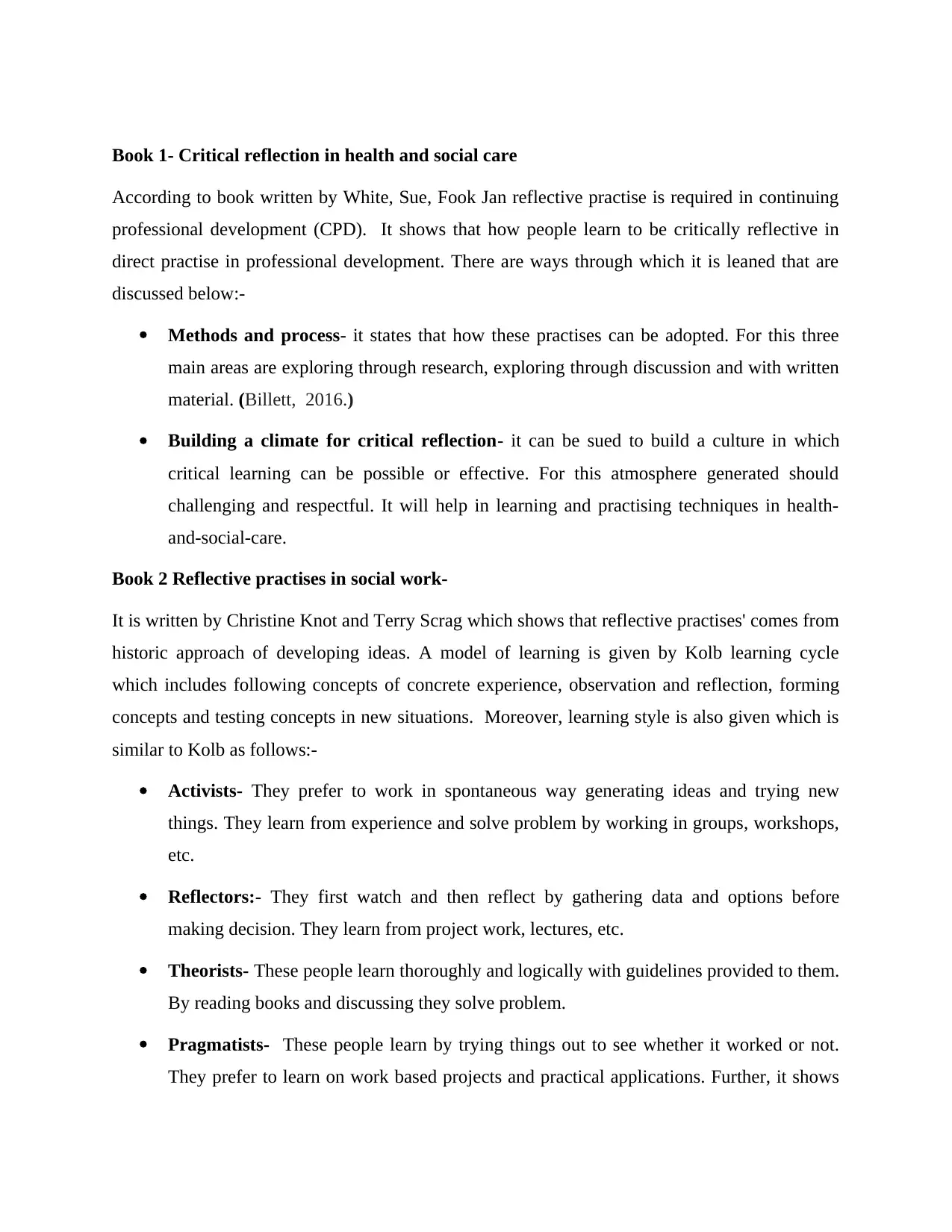
Book 1- Critical reflection in health and social care
According to book written by White, Sue, Fook Jan reflective practise is required in continuing
professional development (CPD). It shows that how people learn to be critically reflective in
direct practise in professional development. There are ways through which it is leaned that are
discussed below:-
Methods and process- it states that how these practises can be adopted. For this three
main areas are exploring through research, exploring through discussion and with written
material. (Billett, 2016.)
Building a climate for critical reflection- it can be sued to build a culture in which
critical learning can be possible or effective. For this atmosphere generated should
challenging and respectful. It will help in learning and practising techniques in health-
and-social-care.
Book 2 Reflective practises in social work-
It is written by Christine Knot and Terry Scrag which shows that reflective practises' comes from
historic approach of developing ideas. A model of learning is given by Kolb learning cycle
which includes following concepts of concrete experience, observation and reflection, forming
concepts and testing concepts in new situations. Moreover, learning style is also given which is
similar to Kolb as follows:-
Activists- They prefer to work in spontaneous way generating ideas and trying new
things. They learn from experience and solve problem by working in groups, workshops,
etc.
Reflectors:- They first watch and then reflect by gathering data and options before
making decision. They learn from project work, lectures, etc.
Theorists- These people learn thoroughly and logically with guidelines provided to them.
By reading books and discussing they solve problem.
Pragmatists- These people learn by trying things out to see whether it worked or not.
They prefer to learn on work based projects and practical applications. Further, it shows
According to book written by White, Sue, Fook Jan reflective practise is required in continuing
professional development (CPD). It shows that how people learn to be critically reflective in
direct practise in professional development. There are ways through which it is leaned that are
discussed below:-
Methods and process- it states that how these practises can be adopted. For this three
main areas are exploring through research, exploring through discussion and with written
material. (Billett, 2016.)
Building a climate for critical reflection- it can be sued to build a culture in which
critical learning can be possible or effective. For this atmosphere generated should
challenging and respectful. It will help in learning and practising techniques in health-
and-social-care.
Book 2 Reflective practises in social work-
It is written by Christine Knot and Terry Scrag which shows that reflective practises' comes from
historic approach of developing ideas. A model of learning is given by Kolb learning cycle
which includes following concepts of concrete experience, observation and reflection, forming
concepts and testing concepts in new situations. Moreover, learning style is also given which is
similar to Kolb as follows:-
Activists- They prefer to work in spontaneous way generating ideas and trying new
things. They learn from experience and solve problem by working in groups, workshops,
etc.
Reflectors:- They first watch and then reflect by gathering data and options before
making decision. They learn from project work, lectures, etc.
Theorists- These people learn thoroughly and logically with guidelines provided to them.
By reading books and discussing they solve problem.
Pragmatists- These people learn by trying things out to see whether it worked or not.
They prefer to learn on work based projects and practical applications. Further, it shows
Paraphrase This Document
Need a fresh take? Get an instant paraphrase of this document with our AI Paraphraser
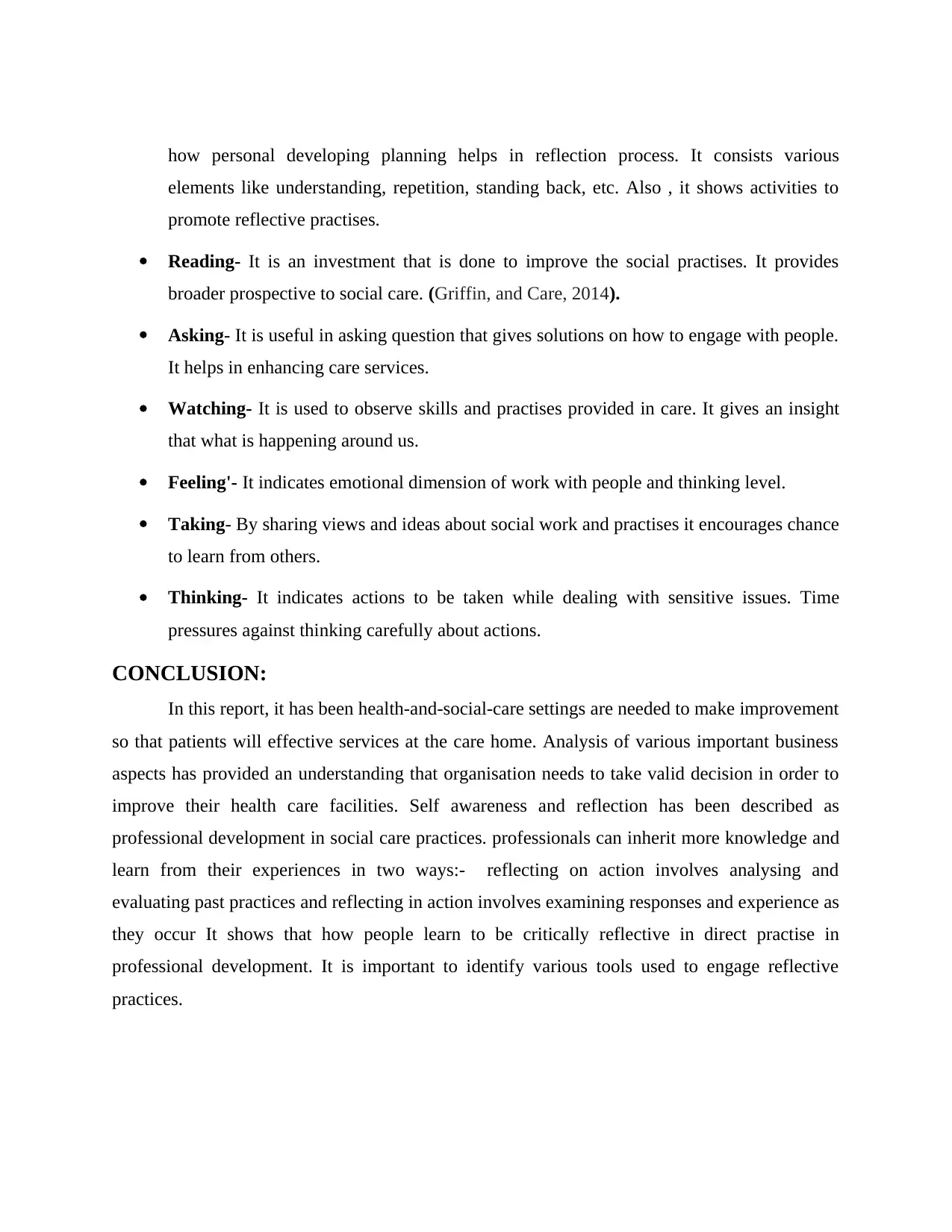
how personal developing planning helps in reflection process. It consists various
elements like understanding, repetition, standing back, etc. Also , it shows activities to
promote reflective practises.
Reading- It is an investment that is done to improve the social practises. It provides
broader prospective to social care. (Griffin, and Care, 2014).
Asking- It is useful in asking question that gives solutions on how to engage with people.
It helps in enhancing care services.
Watching- It is used to observe skills and practises provided in care. It gives an insight
that what is happening around us.
Feeling'- It indicates emotional dimension of work with people and thinking level.
Taking- By sharing views and ideas about social work and practises it encourages chance
to learn from others.
Thinking- It indicates actions to be taken while dealing with sensitive issues. Time
pressures against thinking carefully about actions.
CONCLUSION:
In this report, it has been health-and-social-care settings are needed to make improvement
so that patients will effective services at the care home. Analysis of various important business
aspects has provided an understanding that organisation needs to take valid decision in order to
improve their health care facilities. Self awareness and reflection has been described as
professional development in social care practices. professionals can inherit more knowledge and
learn from their experiences in two ways:- reflecting on action involves analysing and
evaluating past practices and reflecting in action involves examining responses and experience as
they occur It shows that how people learn to be critically reflective in direct practise in
professional development. It is important to identify various tools used to engage reflective
practices.
elements like understanding, repetition, standing back, etc. Also , it shows activities to
promote reflective practises.
Reading- It is an investment that is done to improve the social practises. It provides
broader prospective to social care. (Griffin, and Care, 2014).
Asking- It is useful in asking question that gives solutions on how to engage with people.
It helps in enhancing care services.
Watching- It is used to observe skills and practises provided in care. It gives an insight
that what is happening around us.
Feeling'- It indicates emotional dimension of work with people and thinking level.
Taking- By sharing views and ideas about social work and practises it encourages chance
to learn from others.
Thinking- It indicates actions to be taken while dealing with sensitive issues. Time
pressures against thinking carefully about actions.
CONCLUSION:
In this report, it has been health-and-social-care settings are needed to make improvement
so that patients will effective services at the care home. Analysis of various important business
aspects has provided an understanding that organisation needs to take valid decision in order to
improve their health care facilities. Self awareness and reflection has been described as
professional development in social care practices. professionals can inherit more knowledge and
learn from their experiences in two ways:- reflecting on action involves analysing and
evaluating past practices and reflecting in action involves examining responses and experience as
they occur It shows that how people learn to be critically reflective in direct practise in
professional development. It is important to identify various tools used to engage reflective
practices.
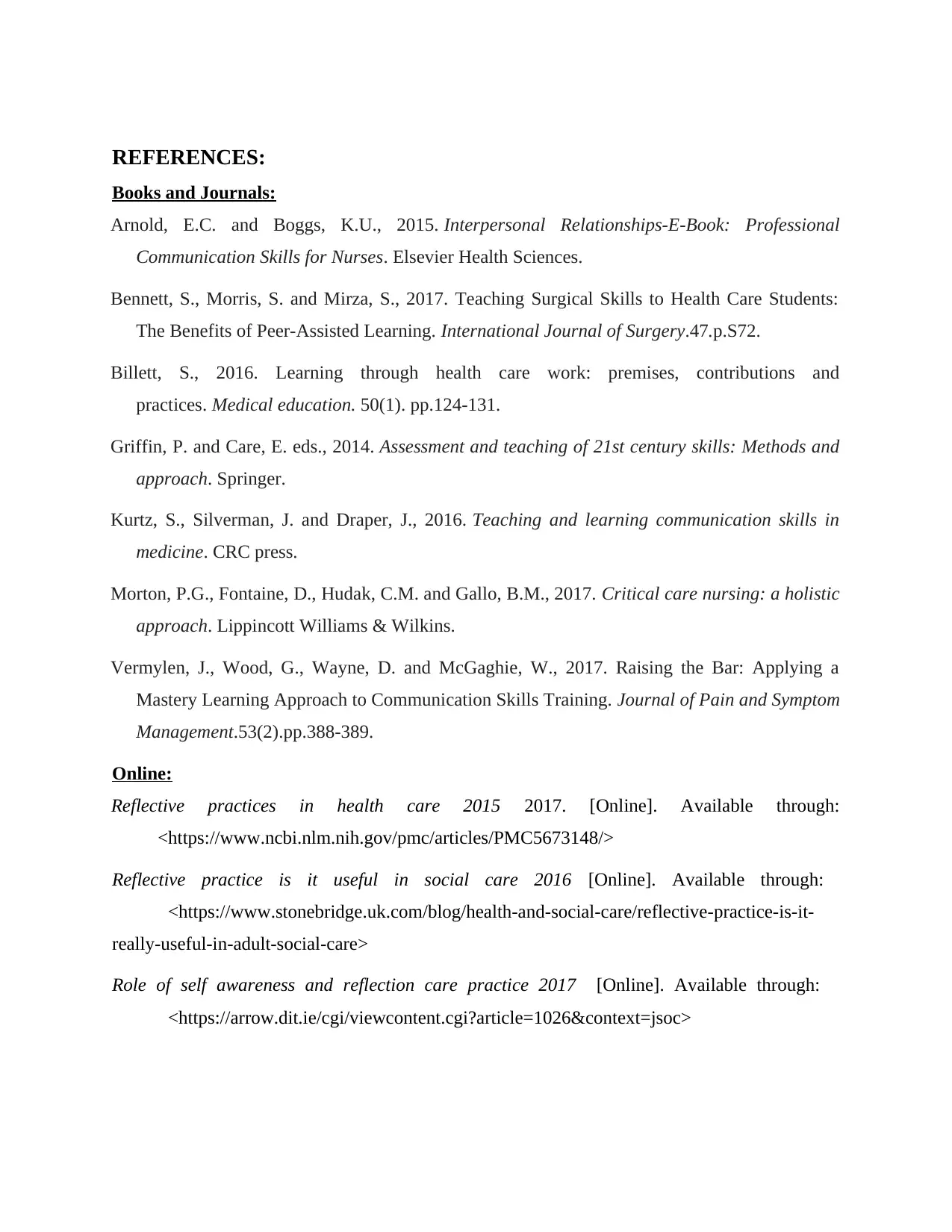
REFERENCES:
Books and Journals:
Arnold, E.C. and Boggs, K.U., 2015. Interpersonal Relationships-E-Book: Professional
Communication Skills for Nurses. Elsevier Health Sciences.
Bennett, S., Morris, S. and Mirza, S., 2017. Teaching Surgical Skills to Health Care Students:
The Benefits of Peer-Assisted Learning. International Journal of Surgery.47.p.S72.
Billett, S., 2016. Learning through health care work: premises, contributions and
practices. Medical education. 50(1). pp.124-131.
Griffin, P. and Care, E. eds., 2014. Assessment and teaching of 21st century skills: Methods and
approach. Springer.
Kurtz, S., Silverman, J. and Draper, J., 2016. Teaching and learning communication skills in
medicine. CRC press.
Morton, P.G., Fontaine, D., Hudak, C.M. and Gallo, B.M., 2017. Critical care nursing: a holistic
approach. Lippincott Williams & Wilkins.
Vermylen, J., Wood, G., Wayne, D. and McGaghie, W., 2017. Raising the Bar: Applying a
Mastery Learning Approach to Communication Skills Training. Journal of Pain and Symptom
Management.53(2).pp.388-389.
Online:
Reflective practices in health care 2015 2017. [Online]. Available through:
<https://www.ncbi.nlm.nih.gov/pmc/articles/PMC5673148/>
Reflective practice is it useful in social care 2016 [Online]. Available through:
<https://www.stonebridge.uk.com/blog/health-and-social-care/reflective-practice-is-it-
really-useful-in-adult-social-care>
Role of self awareness and reflection care practice 2017 [Online]. Available through:
<https://arrow.dit.ie/cgi/viewcontent.cgi?article=1026&context=jsoc>
Books and Journals:
Arnold, E.C. and Boggs, K.U., 2015. Interpersonal Relationships-E-Book: Professional
Communication Skills for Nurses. Elsevier Health Sciences.
Bennett, S., Morris, S. and Mirza, S., 2017. Teaching Surgical Skills to Health Care Students:
The Benefits of Peer-Assisted Learning. International Journal of Surgery.47.p.S72.
Billett, S., 2016. Learning through health care work: premises, contributions and
practices. Medical education. 50(1). pp.124-131.
Griffin, P. and Care, E. eds., 2014. Assessment and teaching of 21st century skills: Methods and
approach. Springer.
Kurtz, S., Silverman, J. and Draper, J., 2016. Teaching and learning communication skills in
medicine. CRC press.
Morton, P.G., Fontaine, D., Hudak, C.M. and Gallo, B.M., 2017. Critical care nursing: a holistic
approach. Lippincott Williams & Wilkins.
Vermylen, J., Wood, G., Wayne, D. and McGaghie, W., 2017. Raising the Bar: Applying a
Mastery Learning Approach to Communication Skills Training. Journal of Pain and Symptom
Management.53(2).pp.388-389.
Online:
Reflective practices in health care 2015 2017. [Online]. Available through:
<https://www.ncbi.nlm.nih.gov/pmc/articles/PMC5673148/>
Reflective practice is it useful in social care 2016 [Online]. Available through:
<https://www.stonebridge.uk.com/blog/health-and-social-care/reflective-practice-is-it-
really-useful-in-adult-social-care>
Role of self awareness and reflection care practice 2017 [Online]. Available through:
<https://arrow.dit.ie/cgi/viewcontent.cgi?article=1026&context=jsoc>
⊘ This is a preview!⊘
Do you want full access?
Subscribe today to unlock all pages.

Trusted by 1+ million students worldwide
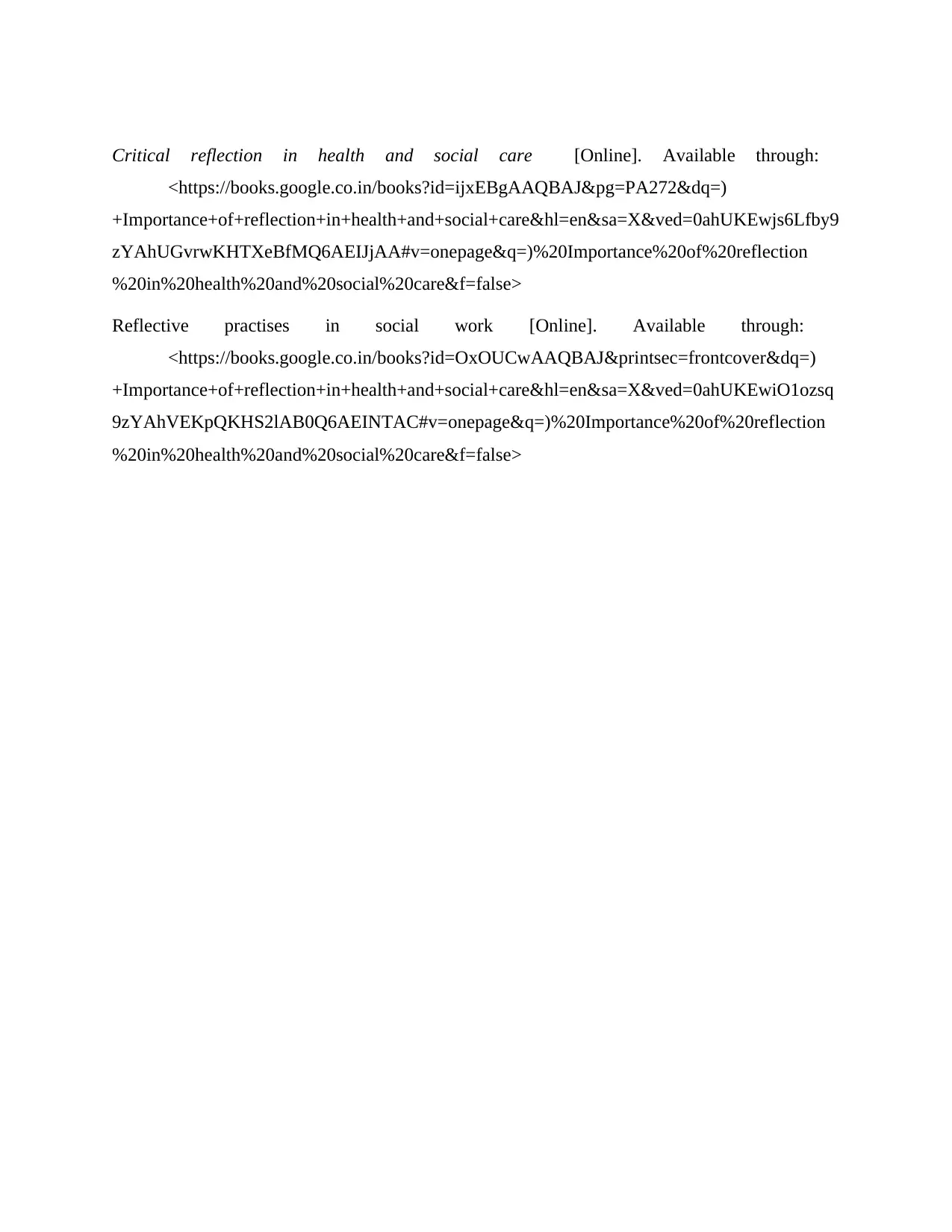
Critical reflection in health and social care [Online]. Available through:
<https://books.google.co.in/books?id=ijxEBgAAQBAJ&pg=PA272&dq=)
+Importance+of+reflection+in+health+and+social+care&hl=en&sa=X&ved=0ahUKEwjs6Lfby9
zYAhUGvrwKHTXeBfMQ6AEIJjAA#v=onepage&q=)%20Importance%20of%20reflection
%20in%20health%20and%20social%20care&f=false>
Reflective practises in social work [Online]. Available through:
<https://books.google.co.in/books?id=OxOUCwAAQBAJ&printsec=frontcover&dq=)
+Importance+of+reflection+in+health+and+social+care&hl=en&sa=X&ved=0ahUKEwiO1ozsq
9zYAhVEKpQKHS2lAB0Q6AEINTAC#v=onepage&q=)%20Importance%20of%20reflection
%20in%20health%20and%20social%20care&f=false>
<https://books.google.co.in/books?id=ijxEBgAAQBAJ&pg=PA272&dq=)
+Importance+of+reflection+in+health+and+social+care&hl=en&sa=X&ved=0ahUKEwjs6Lfby9
zYAhUGvrwKHTXeBfMQ6AEIJjAA#v=onepage&q=)%20Importance%20of%20reflection
%20in%20health%20and%20social%20care&f=false>
Reflective practises in social work [Online]. Available through:
<https://books.google.co.in/books?id=OxOUCwAAQBAJ&printsec=frontcover&dq=)
+Importance+of+reflection+in+health+and+social+care&hl=en&sa=X&ved=0ahUKEwiO1ozsq
9zYAhVEKpQKHS2lAB0Q6AEINTAC#v=onepage&q=)%20Importance%20of%20reflection
%20in%20health%20and%20social%20care&f=false>
1 out of 10
Related Documents
Your All-in-One AI-Powered Toolkit for Academic Success.
+13062052269
info@desklib.com
Available 24*7 on WhatsApp / Email
![[object Object]](/_next/static/media/star-bottom.7253800d.svg)
Unlock your academic potential
Copyright © 2020–2026 A2Z Services. All Rights Reserved. Developed and managed by ZUCOL.



